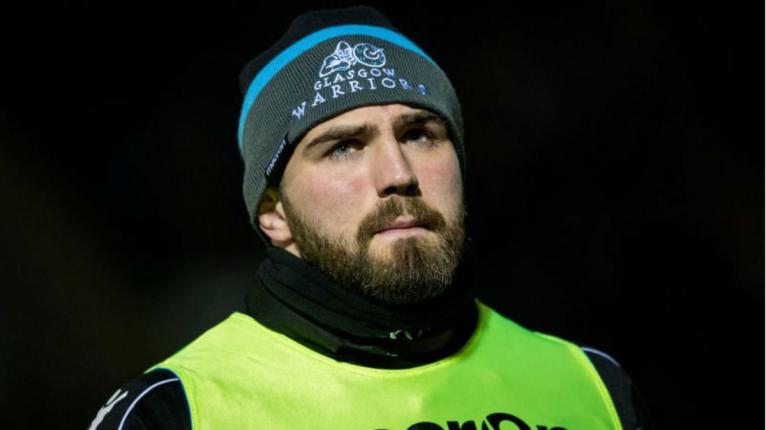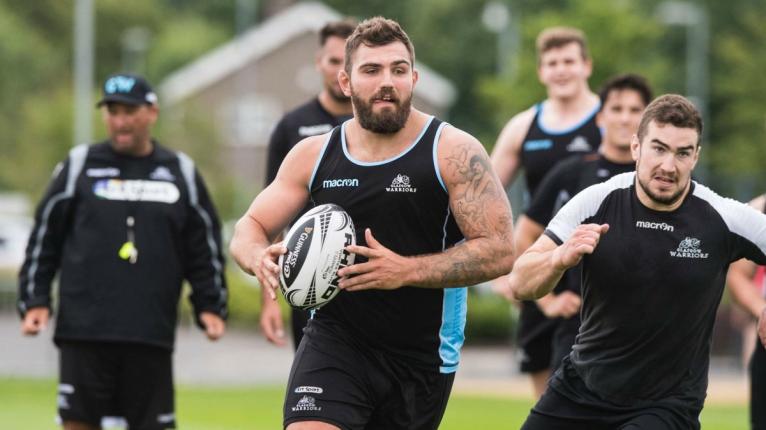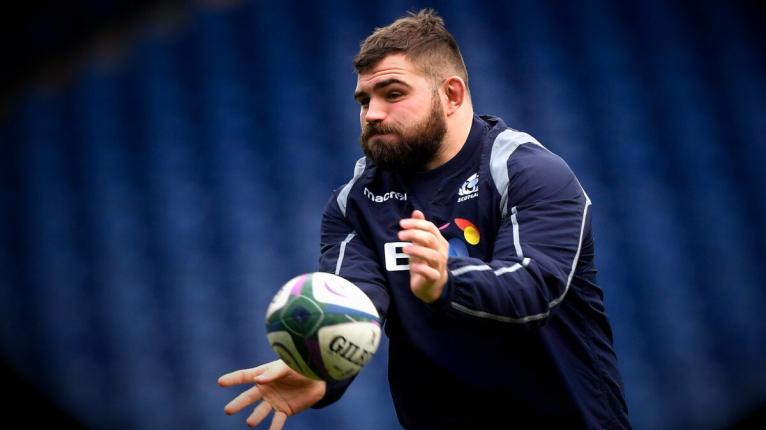'I knew I needed to get out of there' - Jamie Bhatti on why he simply had to leave Edinburgh

Jamie Bhatti was two reps into the dreaded bronco test, a hideous assortment of sprints that is rugby’s universal fitness benchmark and the scourge of players the land over, when his fraying resolve finally gave way.
It was amidst the long, hot summer of Covid-19, Scotland’s players still furloughed but invited back to train under the guise of voluntary sessions. At Edinburgh, Bhatti had been steadfastly stuck as third-choice loose-head. He tumbled down the international pecking order and fed off meagre scraps of game time. No matter how hard he grafted, he never seemed to catch a break.
A collapse was months, maybe even years in the making, but the detonation came suddenly and arrestingly on the back pitches at Murrayfield.
“I just stopped running and walked off,” Bhatti tells RugbyPass. “I went to my car and drove home. When I got to the house, I broke down, started greeting… I can’t do this anymore.
“F**k, I worked in a slaughterhouse for six years killing animals and there wasn’t one day I came home from that place and started crying.
“That’s how I was feeling at Edinburgh, mate. I knew I needed to get out of there.”
Emotion cascaded out of him like a river in spate. How had it come to this?
Less than two years ago, Bhatti was in the form of his life at Glasgow, starting Champions Cup matches and Pro14 play-offs, when he was told there would be no offer of a new contract. He fell gut-wrenchingly short of Scotland’s World Cup squad, and then he went to Edinburgh, where he was cemented behind Pierre Schoeman and Rory Sutherland.
Richard Cockerill, his belligerent head coach, was typically blunt: Schoeman offered more open-field puggy; Bhatti carried too much beef. It proved the culmination of a long and arduous road riddled with setbacks.
“I wouldn’t pin it all on Edinburgh, it was an accumulation of things the past two years,” he says. “The boys there are class. I left Glasgow, not sour, but a wee bit pissed off they didn’t want to keep me. I worked my nuts off when I got to Edinburgh but I just wasn’t getting the rewards for the work I was putting in.
“I kept getting told I was too heavy, not fit enough. Cockers told me if I got down to 118KG he’d start me. On a Sunday night, I would go and sauna for an hour, not eat afterwards, then sauna again on Monday morning, go into training dehydrated to hell just so my bodyweight would look right on paper.
“I wasn’t obsessive, but you knew the s**t you’d get if you went in a couple of kilos out. I won’t name names, but there were other boys in there the same as me – up in the gym doing a wattbike or cross-trainer session at 6am on Monday mornings, then an hour in the sauna, so you’re weighing in alright.
“It got to the stage where the strength and conditioning staff were standing at the scales every day to see you weigh in, or they had one of the interns stand and watch you. That’s just having nae trust in your players as adults.”

In these black days, Bhatti tends to look inwards. He gazes over his shoulder at the places he’s been, the hardships faced and challenges conquered.
Bhatti and his brother were reared on love, but very little else. Their father, as he puts it, “did a runner” many years ago, and for their single mother, making ends meet was a relentless strain. They lived in the modest little town of Sauchie, near Alloa, in central Scotland. The poverty was crippling and at times, it tore through them like a hurricane.
“When we were younger, we had f**k-all,” Bhatti says. “My mum was working two jobs, or not working at all on benefits. She always did her best, putting herself in debt to get me and my brother stuff for Christmas.
“One Christmas, we were homeless – me, my mum and my brother – because mum couldn’t pay the rent. We were put in homeless accommodation up the top of Sauchie. My nana had to take us in to her one-bedroom flat in Alloa town centre.

“Nobody knows that about me, but I’m quite proud to say I’ve been homeless before and I’ve got through it, my family has got through it.
“Whatever happens in rugby, I’ve got through tougher s**t and been in much worse places to get to where I am. Whether it be non-selection or a hard training day or you’re sore – boys moan about being professional rugby players… well, mate, go and work a few days, go and provide, you won’t know what’s f***ing hit you. I know what the reality is like outside the rugby bubble, and it’s scary.”
The reality for Bhatti was leaving school at 15 and working in a slaughterhouse for six years. He reckons he’s killed over 100,000 cattle in his time.
“The job interview consisted of them asking what size of wellies you took.”
At 18, he got his doorman’s licence and worked the pubs and clubs of the area while burnishing his reputation as a dynamic prop forward at Stirling County. The schedule was fierce; the work ethic immeasurable.

“I used to do Monday-Friday in the slaughterhouse, go home, do the doors on a Friday night, play rugby on Saturday, do the doors on the Saturday night and work a Sunday night at a pub,” Bhatti says. “Then on a Tuesday it would be student night at Dusk in Stirling, I’d do a shift there, finish at maybe 3am, go and get a couple of hours’ sleep in my car at the slaughterhouse, and then do the day shift there.
“I played for County, but big John Dalziel [now Scotland forwards coach] got in touch to take me to Melrose and help me push to go professional. I caught the eye of Gregor Townsend up at Glasgow and got signed for the Warriors academy when I was 22.
“But I was still working away at the slaughterhouse and doing the doors all the time I was at Melrose. I was busy back then, like.”
This Christmas brought a timely gift. Miserable and festering at Edinburgh, Bhatti had long been seeking a route out. When Bath suffered a spree of stricken loose-heads, he leapt at the opportunity to join them until the end of the season. There were frank and forthright conversations with Cockerill, for whom Bhatti harbours no ill will, and his Edinburgh contract was terminated to facilitate the move.
He has a precious chance now to play Premiership rugby and restore his stock. He yearns for match minutes, an opening to show his wares. He wants to get back to the days of playing regularly for Scotland again, when he memorably made roadkill of the great Stephen Moore at Murrayfield on a 40m open-prairie dash, the Champions Cup howitzers in west Glasgow and the Pro14 final before a raucous and shuddering Celtic Park.
“I just want to give the best account of myself on the pitch and around the place,” he says. “And if I do get a crack, you’re playing in the Premiership, one of the best leagues around, and the Champions Cup.
Looking forward to an exciting few months ahead @BathRugby 🏉 https://t.co/FfiTBEzbmp
— jamie bhatti (@jamiebhatti) December 21, 2020
“It’s a good opportunity for me to put my hand up to them and to other clubs, and that’s it. I’m in the shop window down there, I’ve got a short period to show what I can do and my plan is to fire in and be the best version of myself.”
They say that nothing worth having comes easy. Bhatti knows that better than most – he is great, bruising, tattooed, athletic proof. The odds were stacked against him making it out of Sauchie and into the professional game.
“If it wasn’t for John Dalziel, Bob Chrystie and Mike Dalgetty down at Melrose, I wouldn’t be where I am,” he says. “I would probably still be in that slaughterhouse, working away, living for the weekend, and that’d have been it.”
Sure, there were good people on hand to smooth the path, but above all, there was a ravenous thirst to get there.
In this coronavirus-ravaged market, contracts in England are scarce, particularly for capped internationals. And yet, it is fiendishly hard to bet against Bhatti, the Clackmannanshire cow-slaughterer who came from the very depths of austerity and scrapped for everything he has earned.
Delighted to be back in the @Scotlandteam squad for the @autumnnations ?? pic.twitter.com/cam5xe7dZI
— jamie bhatti (@jamiebhatti) October 16, 2020













